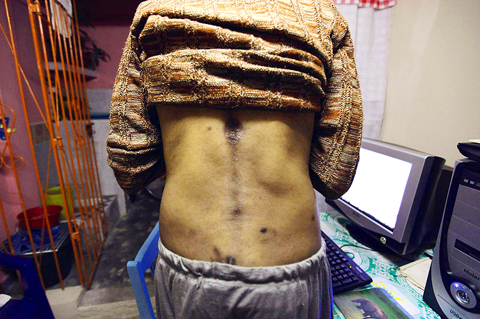When Cuban political prisoner Orlando Zapata Tamayo died this week on an 85-day hunger strike, hopes for near-term improvement in US-Cuba relations may have died with him, political experts said on Friday.
His death in a protest against prison conditions added to tensions caused by the arrest of a US contractor in Cuba and made the political climate tougher for diplomatic and legislative moves to improve ties, they said.
“For the time being all bets are off regarding further progress in US-Cuba relations,” said Marifeli Perez-Stable, a Cuba analyst at Florida International University in Miami.

PHOTO: REUTERS
Zapata’s death prompted indignant statements in Washington, where long-time opponents of communist Cuba said it showed the US must not appease the government of Cuban President Raul Castro by easing the 48-year trade embargo against the island, the cornerstone of US-Cuba policy.
“Let us take his sad and untimely death and renew our commitment to assure that the Cuba of the future is rid of the failed ideology which killed this brave man,” Republican Representative Ileana Ros-Lehtinen said.
For supporters of a thaw in relations with Cuba, Zapata’s death makes it harder for them to make their central argument — that the best way to encourage change in Cuba is to get closer to it.
With unfortunate timing, new legislation was proposed on the day of Zapata’s death that would do just that by ending a general ban on US travel to Cuba and making it easier for Cuba to buy food from the US.
“I have always felt — and continue to believe — that if we are truly going to do a better job of standing with the Cuban people, then we need to be closer to them,” Democratic Representative Jim McGovern said in the US House of Representatives.
“We need to travel freely to the island to meet and learn from them, and them from us,” he said.
A similar problem is facing Spain, which is currently presiding over the EU and has pushed to remove a clause from the EU’s common position on Cuba urging democracy and greater respect for human rights.
Under pressure from the media, Spanish Prime Minister Jose ,Luis Rodriguez Zapatero, a socialist and long-time advocate of close ties with Havana, lamented Zapata’s death and demanded that Cuba free political prisoners and respect human rights.
“That is a fundamental demand of the entire international community,” he told parliament.
Cuba’s small dissident community, meanwhile, vowed to step up demands for democratic change so that Zapata will not have died in vain.
On Friday, four Cuban inmates considered political prisoners and an opposition activist who is not behind bars vowed to stop eating in protest against Zapata’s death. Prisoners Diosdado Gonzalez Marrero, Eduardo Diaz Freitas, Fidel Suarez Cruz and Nelson Molinet, held in the high-security Kilo Cinco y Medio prison in the western province of Pinar del Rio, were refusing solid food, the independent Cuban Commission on Human Rights and National Reconciliation said.
Also on a new hunger strike is Guillermo Farinas, an activist-journalist in the central province of Las Villas who reports independently on Cuba in defiance of state controls on the media.

James Watson — the Nobel laureate co-credited with the pivotal discovery of DNA’s double-helix structure, but whose career was later tainted by his repeated racist remarks — has died, his former lab said on Friday. He was 97. The eminent biologist died on Thursday in hospice care on Long Island in New York, announced the Cold Spring Harbor Laboratory, where he was based for much of his career. Watson became among the 20th century’s most storied scientists for his 1953 breakthrough discovery of the double helix with researcher partner Francis Crick. Along with Crick and Maurice Wilkins, he shared the

OUTRAGE: The former strongman was accused of corruption and responsibility for the killings of hundreds of thousands of political opponents during his time in office Indonesia yesterday awarded the title of national hero to late president Suharto, provoking outrage from rights groups who said the move was an attempt to whitewash decades of human rights abuses and corruption that took place during his 32 years in power. Suharto was a US ally during the Cold War who presided over decades of authoritarian rule, during which up to 1 million political opponents were killed, until he was toppled by protests in 1998. He was one of 10 people recognized by Indonesian President Prabowo Subianto in a televised ceremony held at the presidential palace in Jakarta to mark National

US President Donald Trump handed Hungarian Prime Minister Viktor Orban a one-year exemption from sanctions for buying Russian oil and gas after the close right-wing allies held a chummy White House meeting on Friday. Trump slapped sanctions on Moscow’s two largest oil companies last month after losing patience with Russian President Vladimir Putin over his refusal to end the nearly four-year-old invasion of Ukraine. However, while Trump has pushed other European countries to stop buying oil that he says funds Moscow’s war machine, Orban used his first trip to the White House since Trump’s return to power to push for

LANDMARK: After first meeting Trump in Riyadh in May, al-Sharaa’s visit to the White House today would be the first by a Syrian leader since the country’s independence Syrian President Ahmed al-Sharaa arrived in the US on Saturday for a landmark official visit, his country’s state news agency SANA reported, a day after Washington removed him from a terrorism blacklist. Sharaa, whose rebel forces ousted long-time former Syrian president Bashar al-Assad late last year, is due to meet US President Donald Trump at the White House today. It is the first such visit by a Syrian president since the country’s independence in 1946, according to analysts. The interim leader met Trump for the first time in Riyadh during the US president’s regional tour in May. US envoy to Syria Tom Barrack earlier